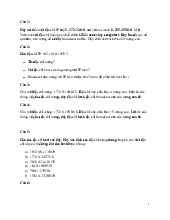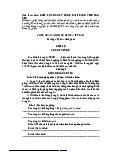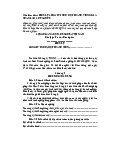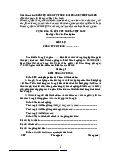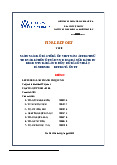



Preview text:
Questions and Answers Section 1 Question:
One of the main tasks the Office of origin performs is certification of the international
application. What does this task include? Answer: The task includes:
Ensuring the information provided on the international application corresponds to the basic mark.
Resolving any issues preventing certification directly with the applicant or their representative. Question:
If a final decision resulting in the partial or total ceasing of effect of the basic mark happens
after the five-year dependency period, what, if anything, is required by the Office of origin? Answer:
If the action leading to the final decision resulting in the partial or total ceasing of effect of the
basic mark was started before the end of the five-year dependency period, the Office must
notify WIPO about the ceasing of effect of the basic mark and, where appropriate, request the
cancellation (to the extent applicable) of the international registration concerned.
However, if the action leading to the final decision resulting in the partial or total ceasing of
effect of the basic mark was started after the five-year dependency period, the Office of origin is
not required to notify WIPO as the international registration has become independent of the basic mark. Section 2 Question:
An applicant is about to file an international application. They have a connection with several
Contracting Parties of the Madrid System as they are a national of Monaco living in the United
States of America. Which Office of origin should they file their application through? Answer:
The applicant can choose either Contracting Party to file their international application provided
they have a trademark with the IP Office of that Contracting Party. Question:
An international application may be filed in any of the working languages of the Madrid System: English, French, or Spanish.
Who determines which language is used in the international application? Answer:
The language used in the application is determined by the Office of origin. The Office is entitled
to restrict the applicants’ choice to only one language, or two, or can permit the applicant to
choose between any of the three. Section 3 Question:
An MM2 form has FRANCE entered in item 1 – Contracting Party Whose Office is the Office of Origin.
Are there any requirements in relation to the Office entered in item 1 that must be met if a
basic mark has multiple owners? Answer:
If a basic mark has multiple owners, all of them have to be indicated as co-applicants in an
international application. If there is more than one applicant in an international application,
each applicant has to be connected to the Contracting Party whose Office is the Office of origin
by establishment, domicile or nationality. Question:
The applicant – a natural person or a legal entity - must be entitled to use the Madrid System by establishing that they:
are a national of a Contracting Party of the Madrid System; or
are domiciled in a Contracting Party of the Madrid System; or
have a real and effective industrial or commercial establishment in a Contracting Party of the Madrid System.
Who will determine whether the nationality, domicile or real and effective commercial or
industrial establishment in the international application form can be certified as correct? Answer:
The interpretation of what may be considered nationality, domicile or real and effective
commercial or industrial establishment is determined by the Office of origin at the time of
receipt of the international application. Question:
The applicant would like to claim priority from their basic mark(s) in their international
application. What information must the applicant include in item 6 of the international application form? Answer:
For each basic mark, that the applicant would like to claim priority from, the applicant must indicate in item 6:
The name of the IP Office with which the basic mark was filed, along with the date of the filing.
If the number of the basic mark is available to the applicant, that should be indicated also.
Where the basic mark does not relate to all of the goods and services listed in item 10 of
the application form, the applicant should indicate the goods and services to which it does relate.
If there are several basic marks with different dates, the applicant will need to indicate
the goods and services to which each relates. Question:
If the mark consists of or contains non-Latin characters, for example Chinese characters, or
numerals other than Arabic or Roman numerals, it is mandatory that the applicant provide a
transliteration of the mark (Rule 9(4)(xii) of the Common Regulations). This means, in simple
terms, a phonetic reproduction of the mark as it sounds, represented in Latin characters.
Is it also mandatory that an applicant provides a translation of a mark that consists of or contains non-Latin characters? Answer:
No, it is not mandatory that an applicant provides a translation of a mark that consists of or
contains non-Latin characters. If the mark consists of or contains words which may be
translated, it would be advisable that the applicant provide a translation into English and/or French and/or Spanish.
A translation of the mark is not compulsory but may be required by certain designated Contracting Parties.
